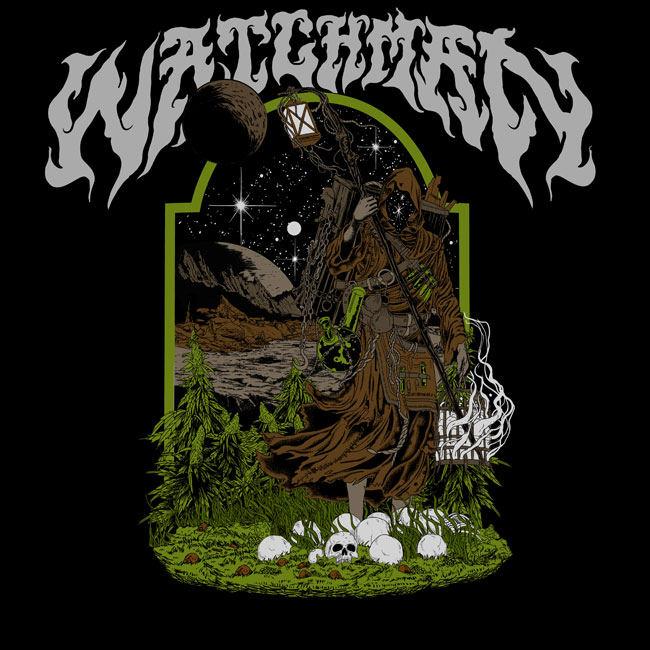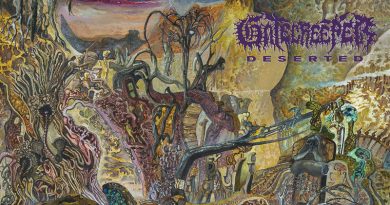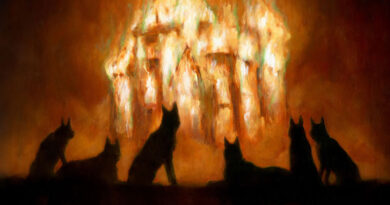Review: Watchman ‘The End Of All Flesh’
Anyone reading this site is probably familiar with the birth of Black Sabbath and their transition from the blues rock band Earth to towering creators and masters of the heavy metal genre. The story tells of the band rehearsing across from a cinema in Birmingham watching patrons queue to watch a horror movie and they decided to make music that scares the shit out of people. Channelling cold war paranoia and other thematic topics of the day, including fear of the Occult and taking inspiration from the films themselves, they carved an irreversible scar in the music landscape.

Doom metal, their spiritual successor, has ploughed these rich fields, surrendering wholesale to the distorted, slower aspects of the quartet, revelling in the grandiose concept of the biblical end of the world, dark Satanic rituals, and setting these concepts to twisted blues that has often shown as much musical progression as being charged by a glacier.
The last time I listened to Watchman, the brainchild of Indiana native, the talented multi-instrumentalist and producer Roy Waterford was the debut EP unleashed on the world at the end of 2020. Apocalyptic and drenched in heady, slow paced, Sabbath inspiration, Behold A Pale Horse showed Waterford as having an ear for crushingly heavy sonic lumberings and downbeat lamentations that seep into the subconscious. That release laid the groundwork for the full-length debut Doom Of Babylon in 2021 which saw Watchman praised for the ability to capture strikingly bleak psych delivered with the rabid conviction of a true disciple.
Returning a year later with his latest collection of grim tales, Watchman now brings us seven more sky claw inducing, misery drenched slabs that continue this prophesying of the end times on The End Of All Flesh.
Suitably mournful guitar fuzz reverberates with the rich retro vibes, like a warning from the past coming back to haunt us as Pour Out The Vials crawls from the speakers. Appropriately sombre, the distorted vocals add an additionally mournful aspect to the murky feel. The sinister riffing continues with Fire And Brimstone, Waterford’s voice sits low in the mix with a chanting refrain over the snaking guitar and stoner drone, like being seated in a congregation on a heavy drug trip that shares a connection with early Electric Wizard.
Death Is Coming is awash with weeping strings augmenting the gargantuan plodding bass. The Eastern flavour established on the EP adds to the otherworldly mantra, channelling the spiritual aspects that go hand in hand with the religious portents that dominate the thematic subject of the music.
The mellow and sinister keys that create a Hammer Horror score feel to Divided Kingdom offers a respite from the dense overdrive, giving the track an interlude feel to the centre of the album, hypnotic and shifting focus like the aftermath of the first act and a scene setting piece for what is yet to come.
like being seated in a congregation on a heavy drug trip that shares a connection with early Electric Wizard…
The ‘70s influence returns more noticeably on Righteous Indignation as not only could the sludgy breakout of the music be traced back to Iommi and co, the vocals have the strangled delivery of Electric Funeral. Whilst the album is largely shrouded in mysticism, here Watchman invokes the Revelations themed end times with the coming of a deity’s fury and the stripped down solo is a sorrowful composition, grieving for what is to come.
The Smoke is built around the same downbeat trip, dirge-y but rich tonal timbres contrast with the note progressions and accented high notes smothering the atmospherics in misery. It mesmerises you like the flute playing of a snake charmer, swaying and trapping you in its focus, before ending with the title track, The End Of All Flesh. Here the subject matter is dealt with using almost serial killer like lyrical inflection, each line stretched out from the simple repetitive hooks to an uncomfortable and spiteful celebration.
Throughout the album you can draw many lines between events in the modern world as we hurtle towards climate change, war creeps back into Europe, nations are divided and hyper-capitalism strips people and the earth of its natural bounty and dignity that goes beyond the religious imagery that is associated with the genre.
Musically The End Of All Flesh continues the template laid out on the two previous releases, swelling the Watchman canon to add varying degrees of nuance to the thick, gloomy sound. As with the finest of doom music, Waterford wallows in the theme and indulgently re-treads the template, concentrating on minute moments, rather than seismic shifts in songwriting to vary the tracks, leading the listener to both lose themselves in the album and simultaneously feel like it drifts by.
Watchman never jumps out of the speaker at you and as a result, the production can feel subdued; the walls of sound slither into the consciousness rather than assault you, meaning that the album gives off a sense of decay and creeping entropy, like some ghastly narrator documenting mankind’s fall to ruin. The lack of clarity in production does rob Watchman of some of the power that doom can achieve; for example, recent releases from My Dying Bride and Skepticism shine bright with clarity that almost contrasts with the funeral march of the music. Waterford has opted for a more old school, dirtier sound which makes this album sound like a throwback.
The End Of All Flesh is unlikely to win any new fans to the genre if I can be honest without sounding negative. The music here is very considered, singular and fantastic in its dedication, but it is very much doom metal for fans of doom who love that downtrodden Sleep vibe, with cosmic flavours of grinding groove.
Label: Wet Records
Band Links: Bandcamp | Instagram
Scribed by: Mark Hunt-Bryden



